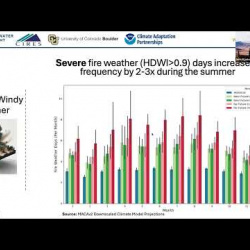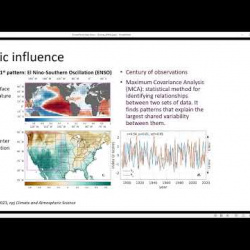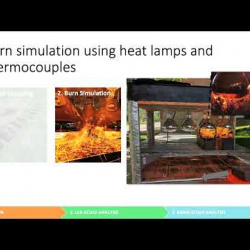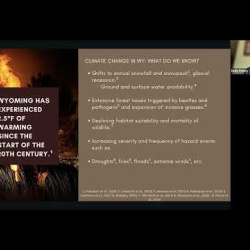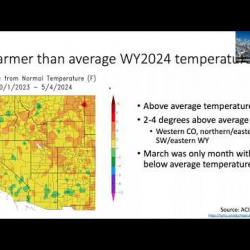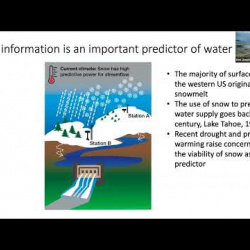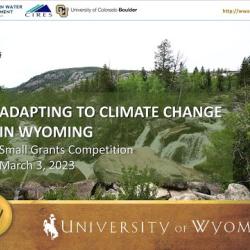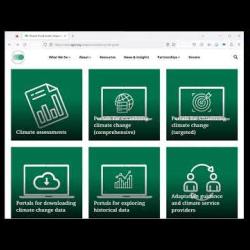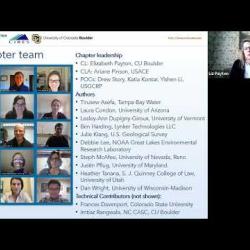-
Wildfire Risk and Community Resiliency: Identifying Hazards to Build Resilience in Communities Across The West
-WebinarWestern Water Assessment hosted a webinar in partnership with Mountain Towns 2030, "Wildfire Risk and Community Resiliency: Identifying Hazards to Build Resilience in Communities Across The West," on June 11 from 11 am - 12 pm MT.
Wildfires are now becoming an omnipresent threat throughout the year. Western Water Assessment presents their data on wildfire risk to communities across the West and identifies existing hazards, while outlining some resilience strategies that will help communities prepare for these devastating events.
Speakers:
-
SWE-Fusion: Multi-Source, Real-Time Snow Water Equivalent Data to support water resource management in the Western US
-WebinarSpatially distributed snow water equivalent (SWE) estimates have a variety of potential applications in water resources, land-surface hydrology, and ecosystem science. The past decade has seen an explosion in spatial snow-water data availability and an associated expansion of water management utilization of these data. Historical satellite-based observations of fractional snow-covered area now exceed 20+ years (e.g. from Landsat & MODIS). These data sets have enabled evaluations of real-time spatial SWE estimates in the context of the past.
-
Emerging forecasting tools for seasonal water resource prediction
-WebinarWestern U.S. water managers facing changing climate and growing populations are seeking new tools to guide their planning and operational decision making. This presentation from WWA PI Court Strong highlights two key tools that emerged from a five-year collaboration between university researchers and Salt Lake City Department of Public Utilities. Using a 100-year record of streamflow from ten watersheds, we found that variability in groundwater storage, derived from winter streamflow, is the primary factor controlling runoff efficiency.
-
Burning Issues: Assessing Water Quality Challenges Post-Wildfire
-WebinarWildfires pose significant challenges to water treatment plants and freshwater systems by increasing sediment, nutrient, and dissolved organic matter (DOM) loads in streamflow, as well as exacerbating flooding through elevated runoff rates. This presentation by WWA Director Ben Livneh highlights findings from a multi-scale analysis that examines the effects of wildfires on sediment, nutrients, DOM, and runoff across multiple watersheds. We utilized laboratory-scale wildfire and rainfall simulations to explore small-scale processes influencing soil and water changes.
-
Climate Change in the Cowboy State: Risk Perceptions in Rural Wyoming Counties
-WebinarThis webinar covers findings from Emily Peters' thesis research that she conducted as an Environment, Natural Resources & Society (ENRS) graduate student at the University of Wyoming. This study examined participant perceptions of climate-related hazard impacts through twenty qualitative interviews in four Wyoming Counties with formal rural and disadvantaged designations to increase our understanding and approach to addressing climate risk in the state.
-
Following perfection: a summary of the 2024 water year
-WebinarAfter a record to near-record water year in 2023, how would the 2024 water year compare? Would 2024 mark a return to wetter conditions or a slide back into drought that has plagued the region for decades? In this webinar, WWA Research Scientist Seth Arens summarizes weather conditions from fall and winter and provides insight into how the remainder of the water year may unfold. El Niño conditions prevailed throughout winter 2024 and temperature and snowpack conditions were generally consistent with expectations for a year with strong El Niño conditions.
-
New insights into the role of snow and machine learning tools in water supply prediction
-WebinarFor large populations across the western U.S., water supply prediction relies centrally on knowledge of spring snow conditions, where snowpack can provide critical early warning of anomalous water supplies. As drought conditions emerge or future temperatures rise, snowpack is likely to decline, causing the relationship between snow and streamflow to shift. Recent research found that in the future, snowpack will be less predictive of drought in snowmelt-dominated systems in the western U.S.
-
Adapting to Climate Change in Wyoming: Small Grants Competition
-WebinarAdapting to Climate Change in Wyoming: Small Grants Competition
The University of Wyoming and Western Water Assessment (WWA) are pleased to announce the Adapting to Climate Change in Wyoming grant competition.
-
New Climate Information Tools: A User Guide to Climate Change Portals and the Utah Hazard Planning Dashboard
-WebinarThe landscape of climate change information is like a rainforest: rich and diverse, but hard to navigate. A User Guide to Climate Change Portals is a new online resource designed to help people and communities acquire and interpret climate change information that is appropriate for their locality in the Mountain West and beyond. Jeff Lukas of Lukas Climate Research and Consulting and Julie Vano of the Aspen Global Change Institute walk through the User Guide and the six types of curated information resources that are highlighted in the guide.
-
Climate change and the water cycle: Call for public comment on the draft Fifth National Climate Assessment
-WebinarAcross the US, floods, droughts, and other water-related hazards are being amplified by climate change, but the impacts are not falling equally across regions and populations. Learn about the consequences of an intensified water cycle in the Fifth National Climate Assessment (NCA5) draft, which is now posted for public review and comment. WWA, as part of its webinar series, hosted this webinar on January 12, 2023, about the draft Water Chapter of the NCA5.
